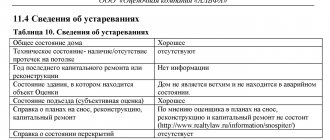For those who want to sell an apartment without a realtor, we have collected all the tips on preparing an apartment for sale, a list of necessary documents, the nuances of completing the transaction and making payments in one place. Use our step-by-step instructions to help you sell your apartment on your own!
How to sell an apartment yourself: general rules
If you are planning to sell an apartment yourself, you must be prepared to spend time and money on it. With a realtor, the process will be faster, but for help in finding a buyer you will have to pay 10% of the transaction cost, depending on the region. It makes sense to contact real estate agencies if we are talking about selling a “complex” apartment - for example, located in another city, etc.
If you are selling a standard apartment and carefully follow the instructions, then there should not be any special problems.
Before selling you will need to do:
- Collection of missing documents;
- Conduct pre-sale preparation of the apartment;
- Place advertisements for the sale of an apartment on relevant web sites;
- Organize a viewing of the apartment for potential buyers;
- Check buyers' documents;
- Conclude preliminary and main agreements.
When selling an apartment on your own, you also need to take into account whether it was purchased with maternity capital or not, whether minors live in it, whether there is a mortgage encumbrance, etc.
Selling an apartment: where to start
Conventionally, the process of selling an apartment can be divided into two stages: preparatory and main.
What is needed to sell an apartment:
- Determining the value of your apartment;
- Decluttering, cleaning, emptying the apartment of things;
- Cosmetic repairs - if necessary;
- Collection of documents;
- Placing advertisements and sales on thematic resources;
- Showing the apartment to responding buyers.
The main stage of selling an apartment includes:
- Drawing up a preliminary agreement and receiving a deposit;
- Signing of the main agreement with subsequent registration;
- Transfer of apartment and keys;
- Receiving the remaining money;
- Payment of tax duty.
Step-by-step instructions for selling an apartment without a realtor
Determining the value of your apartment.
There are two ways to go here:
- Independently monitor prices for apartments in your area, comparing your apartment (footage, technical condition) with similar apartments. This way you can understand the average price on the market.
- Order an apartment appraisal report (price from 2-3 thousand rubles), which will contain information about the market value and liquidation value of the property you own.
Do not forget that the price at which you are going to put the apartment up for sale must correspond to the market value. An inflated price will force potential buyers to consider more profitable offers, and accordingly, you will not be able to sell the apartment quickly.
Advantages and disadvantages of purchasing such real estate
The benefits include the following:
- A significant discount, since sales of such real estate are usually urgent. Approximately 20% lower than average prices.
- A prepared package of documentation, as it was required when drawing up a will, or registering the right of inheritance.
- Preliminary check of the apartment for the purity of the title, which was carried out by a notary.
The many disadvantages that have been mentioned include:
- high risk of challenging the transaction;
- thorough verification of the seller's legal capacity.
REFERENCE: Since the real estate market always carries risks for the buyer, the option of purchasing an inherited property is not much different from other options.
When determining the cost of an apartment, we recommend taking into account the following parameters:
- An area whose size is directly proportional to the price: more square footage means higher cost;
- The number of rooms and their location relative to each other. Isolated rooms and separate bathrooms will have an advantageous effect on the price. But adjacent rooms and a combined bathroom will lower it. The same applies to storage rooms, laundry rooms - their presence or absence, as well as the condition of the balcony.
- Number of storeys (the first and last ones are in less demand);
- The presence or absence of repairs;
- Location and infrastructure of the area. In cities with a population of over a million, apartments near transport interchanges and the metro are more highly valued. For families with children and the elderly, the close location of hospitals, pharmacies, parks, schools, kindergartens and playgrounds will be important.
- General condition of the house. Thus, houses built half a century ago may have technical problems: leaking roofs, poor plumbing, etc. We would like to make special mention of houses that are classified as cultural heritage sites (cultural heritage sites). Selling them is much more difficult, despite the tempting idea of living in a cultural monument. Taxes and repair requirements are much higher here, making them less attractive to buyers.
- Legal aspects: presence of encumbrances, unpaid utility debts, etc.
Pre-sale preparation of the apartment
Give your apartment a presentation! Carry out a general cleaning and get rid of unnecessary things that “eat up” square meters. This way you can show off the space and create a cozy atmosphere, which will make the apartment more attractive. If necessary, you can make cosmetic repairs, as well as bring windows, doors, electrical and plumbing into working condition. According to statistics, even if you spend 3% of the property value on renovations, you will sell the apartment for 7% more.
If there is no remedy at all, you can peel off the wallpaper and, at a minimum, wash the apartment of dust and dirt. Such an apartment can be put up for sale as prepared for renovation.
Also, the condition and appearance of the entrance, staircases, etc. may influence the purchase decision. Clean walls, free of graffiti, will at least make the entrance more attractive.
Collection of documents
Here is a list of necessary documents (and deadlines) that you will need when selling an apartment on your own. Please note that the list of documents when selling an apartment may have its own characteristics, for example, if you are selling an apartment purchased with maternity capital, with a mortgage, or if you have minor children.
| Documents required immediately | Documents with a limited validity period that must be obtained before the transaction itself |
| Certificate of ownership of the apartment. If the property was purchased after the certificates were cancelled, you will need an agreement under which the property was transferred into ownership and an extract from the Unified State Register of Real Estate | Consent of the guardianship authorities to sell the apartment if the interests of the minor owner are affected |
| Passport or birth certificate for child owners under 14 years of age | Certificate form 9 (certificate of family composition, issued free of charge at the MFC) |
| Cadastral passport for an apartment (can be obtained from the MFC, Rosreestr or directly from the Cadastral Chamber) | Certificate of settlements with utility services or receipts for utility payments for recent months |
| Technical certificate | |
| Certificate from the tax service confirming the absence of debts | |
| Consent of the second spouse to the alienation of real estate |
Risks and problems for the buyer
If the procedure for inheriting an object occurred with violations, and errors were made in the registration of property rights, or the rights of third parties, the sale is problematic. It should be taken into account that with the alienation of the property to the buyer, all unresolved issues and newly arisen problems related to the title of the purchased property are transferred to him.
These include:
- Bad faith of participants in the inheritance procedure who did not notify all persons who have the possibility of succession. In this case, upon learning of the death of the testator, third parties have the right to assert their legal rights.
- After entering into an inheritance and completing the transaction, the seller will be recognized as an unworthy heir (Article 1117 of the Civil Code of the Russian Federation), which will lead to the recognition of the transaction he has completed as void.
- The will under which the property was transferred will be contested, which will also lead to the nullity of the sale and purchase.
- According to a will, a testamentary refusal can be transferred along with real estate - the right of one of the relatives to live in the living space for life (Article 1137 of the Civil Code of the Russian Federation).
- After the division of property according to the law, a will will be discovered, requiring a review of the legal positions of the heirs.
- The deceased owner violated the rights of minor children during privatization. After coming of age, they can claim their share.
ATTENTION: A property transaction does not cancel the rights of third parties to an apartment if their property interests were damaged as a result of the transaction, or were knowingly violated by previous rights holders.
Fraudulent schemes
In addition to the dishonesty of the heirs or testators themselves, such apartments are often involved in fraudulent schemes. Fraud can be expressed in openly illegal actions of heirs who took possession of real estate, bypassing the rights of other persons authorized to acquire inherited property:
- through an illegally executed will;
- through false documents;
- bypassing the queue according to the law.
Typically, illegally obtained property is sold as quickly as possible, while other potential legal claimants remain in the dark about their inheritance rights. Naturally, such fraud will be exposed, but the buyer will become a victim of deception and a participant in legal disputes, with the risk of losing the purchased home.
Professional fraudsters operating in the real estate market often draw up fake wills from single owners, according to which they enter into an inheritance. Sometimes such documents are extorted from elderly owners shortly before their death. Subsequently, relatives of the second or third line of kinship can prove that the testator was incompetent at the time of execution of the will, restoring their own rights to the property.
If it is proven that the will is fake, the transaction is canceled: in this case, the buyer finds himself in a difficult position, since accepting restitution accompanying the cancellation of the transaction can lead to unpleasant consequences.
- The object that he acquired illegally is alienated to its rightful owners.
- The money he paid to the scammers will be lost forever, since it will most likely be impossible to find it.
IMPORTANT: Proceedings of the case in court require the provision of complete information about the defendant, and are not initiated against an unknown attacker.
Similar legal consequences can arise with such types of fraud as a fake deed of gift drawn up during the owner’s lifetime or an invalid sales contract.
How to protect yourself?
To minimize risks, or even better to avoid them, a thorough check of the transaction for purity will be required. Legal purity is a guarantee that the purchased housing, after the transfer of ownership, will not be encroached upon by third parties whose rights have been violated. Accordingly, it is necessary to identify the presence of third parties who may suffer during the transaction or to verify the absence of them.
In this context, when purchasing an inherited apartment, you need to check the package of documentation for the property and find out a number of essential conditions. The important points are:
- Get an archival extract from the apartment register and find out who lived with the deceased.
- Find out whether there are any registered relatives left, whether one of them has received the right of testamentary refusal (we talked in detail about the consequences of buying an apartment with registered tenants here).
- The seller, if he is not one of the spouses, children or parents who have a priority right to inheritance, should find out about the presence of close relatives.
- In the will, check the allocation of a mandatory share to close relatives.
With a package of documentation, it is advisable to contact a lawyer with the necessary competencies so that he can check the legality of the transaction and help draw up the contract. In the case of a will, it is best to contact a notary to conclude the transaction, who knows the intricacies of preparing testamentary procedures and will determine the authenticity of the testamentary document.
The safety of the purchase is guaranteed if the seller is a first-degree relative and has a certificate from the registry office about full brothers (sisters). Regarding the parents of the deceased, their death certificates must be available, or they must be included in the number of heirs or provide a waiver of participation in the procedure. The same applies to the testator's spouse.
However, one should not discount the fact that applicants may appear from among children from other marriages. If, under the above circumstances, the absence of other applicants is guaranteed, the risks can be considered insignificant.
ATTENTION: For a full guarantee, it is best to buy an apartment that has been inherited and has been owned for at least 3 years.
Read about the nuances and pitfalls of buying and selling an apartment that has been owned for less than 3 years here.
You should always take into account the risks associated with the testamentary procedure:
- for a certain reason, the will may not be in the notary’s office where the inheritance was opened, and it may emerge after the property is divided and sold;
- when implementing a testamentary disposition, it is not taken into account that the testator drew up a later will.
Therefore, before the transaction begins, it makes sense to contact the notary office “Inheritance Without Borders” with a request.
What clauses of the purchase and sale agreement should I pay attention to?
Despite the fact that all provisions of the contract are subject to mandatory execution, and therefore must be checked with special care, inherited property requires additional security measures. Particularly important terms of the contract:
- The subject of the agreement must include language stating that the apartment was received by will (by law) and is not encumbered by litigation.
- The rights and obligations of the parties must indicate that the transaction did not violate the rights of third parties and other claimants to the inheritance. Here you should also check the inclusion of a subclause on the possibility of a testamentary refusal or other encumbrance.
- The provision on the responsibility of the parties must necessarily contain the wording that upon termination of the contract, everything received under the transaction is returned to the parties in full.
In order to ensure that in the event of a dispute with the contract, the buyer does not lose the right to receive money, it is imperative to make sure that the amount paid is included in the contract, taking into account the advance payment or deposit, if one was paid.
REFERENCE: On the sale of real estate owned for less than three years, personal income tax is charged in the amount of 13% of the value of the property specified in the contract.
Often an apartment is sold immediately after inheritance, which requires the seller to pay tax. Apartments worth up to 1 million are not taxed. The seller can convince the buyer to contribute a tax-free amount to the contract. Therein lies another risk.
If the restitution transaction is contested, the seller will legally receive the sold apartment, and the buyer will receive 1 million rubles, even if the amount is indicated on the receipt.
What documents are needed to sell an apartment?
Basic list of documents for selling an apartment
- USRN Help
- Cadastral and technical passport
- Extract from the personal account
- Certificates about family composition
- Preliminary purchase and sale agreement
- Contract of sale
- Apartment acceptance certificate
Tips for completing a deal: how to stay a winner?
If the price and quality of the property makes the deal look profitable, you can proceed with the purchase and sale of the apartment.
You need to be wary if:
- the seller acts under a general power of attorney;
- does not provide any information on the fact of inheritance;
- representative – the only person completing the transaction;
- the price of the apartment has been reduced by more than 20% compared to similar properties.
If these factors are absent, the documentation is checked:
- The seller's passport is verified against the identity.
- The documents for the apartment are being reviewed.
- The certificate of inheritance is checked and the seller’s co-heirs are identified. Based on the number of co-heirs, the following are verified:
- submitted consents for the sale of the apartment;
- notarized powers of attorney;
- refusals of inheritance.
The documentation attached to the title document (certificate) must correspond to the number of participants in the inheritance procedure. None of the participants included in the receipt of the inheritance can withdraw from the transaction unreasonably; an oral refusal of the inheritance has no legal force .
To check documents, it is best to enlist the support of a lawyer for the transaction as a whole, or carry it out through the mediation of a reputable real estate company. A notary will give additional legal capacity to the purchase and sale agreement. But the most significant guarantees, up to the return of the amount of money spent on an apartment in the event of an insured event, are provided by title insurance of real estate.
IMPORTANT: The specialist or company accompanying the transaction will represent the buyer in court if the contract is disputed.
Posting an ad
We advise you to adhere to the following rules for posting and preparing an advertisement:
Shoot the apartment in the morning or afternoon in natural light. When shooting, emphasize the footage and the main advantages of the apartment. If there is a storage room, remove it. If the bathroom has new tiles and the pipes have been changed, this also deserves attention! Show the view from the window, the availability of parking, and a well-groomed local area.
When composing an advertisement, indicate the main parameters of the apartment, note the infrastructure (gardens, schools, hospitals, etc.). Make the ad as informative as possible so that the buyer does not have any questions.
Place an ad on several sites for the sale of housing. These can be both websites and groups on social networks, where it is possible to post your ad for free (or for a small price) and sell it.
Showing the apartment to potential buyers
Be polite and friendly - a pleasant impression, including from the owner, is conducive to making a purchase. During the conversation, find out for what purpose the apartment is being purchased. For those planning to rent out, a concession in the form of household appliances or furniture that you are willing to keep will be relevant. For those who are buying for themselves or loved ones, tell them in detail about the advantages of your particular apartment compared to similar ones for sale in the same area.
Transfer of money when buying an apartment. How does money transfer happen when buying an apartment?
Main stages of selling an apartment
As we said above, the main stage of buying an apartment includes:
- Signing a preliminary agreement or deposit agreement;
- Signing the main purchase and sale agreement;
- Its registration;
- Receipt of the remaining amount.
Risks when buying an apartment received by inheritance
Purchasing an apartment is a risky undertaking. There are different situations in the real estate market.
Options for fraud with inherited real estate:
- The will was drawn up under the influence of threats, by an incompetent owner or by a citizen who did not understand the consequences of his actions. The heir takes over. The apartment is resold several times. Proper heirs have the right to challenge the will in court.
- The relatives of the deceased citizen did not know about his death. But subsequently they go to court with a request to restore the deadlines. If the court satisfies such requirements, the previously issued certificate will be invalidated. Consequently, the registration of inheritance occurs again. Property shares are redistributed.
The buyer bears the risk of losing the funds paid as payment for the apartment. An inherited apartment is one of the most problematic objects on the real estate market.
The recipient needs to find out the following information:
- inheritance was by will or by law;
- how many years have passed since the registration of the inheritance?
By will
A special feature of purchasing an inherited apartment received under a will is the ability to study the document. The buyer can read the order and learn about its features.
Important! The seller's desire to hide the document should alert the buyer. If the seller is not planning fraudulent activities, then there is no reason to hide data.
The main difficulties when buying an apartment received under a will:
- The presence of a testamentary refusal or assignment (Article 1137 of the Civil Code of the Russian Federation). A citizen could include a requirement for a dependent or relative to live in the apartment. The law protects the rights of the recipient, therefore, in the event of resale of the apartment, the right to reside is preserved.
- The presence of several heirs. The purchase and sale agreement must be signed personally by each of the owners. However, citizens often issue a notarized power of attorney for one of the sellers. In the will, it is necessary to find out how many heirs the living space is bequeathed to. If the owners do not include one of the potential recipients, then purchasing the property is fraught with trouble.
Perhaps the heirs registered his share legally (by absolute or targeted refusal). However, it is possible that the citizen simply did not know about the existence of the document. In this case, the purchase is fraught with litigation.
- Presence of minor heirs . If the will specifies a minor heir, but he is not one of the owners of the apartment, then it is necessary to request permission from the district guardianship department to refuse to inherit . The presence of a refusal indicates that the amount of property is less than the amount of debts of the deceased. Otherwise, the guardianship department will not give such permission. You need to study the information - perhaps the apartment is under mortgage. Then you also need permission from the bank to sell.
- Actual entry into inheritance . If the property is accepted upon delivery, the seller does not have the necessary documents for the property. Perhaps the heirs did not know about the need to register the property that is in their use. Therefore, you need to check that you have all the necessary documents for the apartment, including a certificate of inheritance rights.
Without a will
Risks when purchasing an apartment inherited by law:
- The list of heirs is not reliably known even to the recipients themselves. The testator could hide information about illegitimate children, children from other marriages, and dependents.
Example. Citizen R. worked for a long time in a position that required business travel. He was away 5 months a year. After his death, his wife and son took over the inheritance. However, a year later a woman showed up. She explained that citizen R. lived with her during business trips. They also have a child together, whom the testator officially recognized. Since she was not given information about his death, she could not submit documents to the notary on behalf of her son in a timely manner. The court restored the deadline for entering into inheritance. The property was distributed among 3 heirs.
- Identification of heirs by right of representation or hereditary transmission . In such a situation, the right to receive the property of the deceased is vested in the heirs of the 2nd or subsequent stage . However, by right of representation, grandchildren can receive a share in the property. This option is fraught with the complete seizure of property from the heir of the 2nd stage .
Example. At the time of the death of citizen A., she did not have an official spouse. And her son and parents died. Therefore, my own sister took over the inheritance. However, after 3 years, his son’s partner showed up. They had a daughter together. Paternity has been officially established. Therefore, the girl had the right to a share in her grandmother’s property. The sister’s certificate of inheritance rights had to be canceled and the rights to the property were transferred to her granddaughter.
It is almost impossible to foresee all the risks in such a situation. The acquisition of such residential premises is advisable only after the expiration of the 10-year statute of limitations.
Purchasing an apartment inherited for less than 3 years
A special feature of a transaction with an apartment inherited up to 3 years ago is the need for the seller to pay income tax.
After selling the property, the citizen must:
- file a tax return within the prescribed period;
- pay personal income tax in the amount of 13% of the cost of the object.
Therefore, the seller often insists on an artificial reduction in value in the purchase and sale agreement. He asks to hand over the rest of the funds to him in cash.
Reasons for refusal to reduce the price of an apartment in the contract on the part of the buyer:
- If significant defects in the residential premises are identified, which the seller knew about but hid, it is possible to terminate the transaction in court. However, only the amount under the contract is refundable. If the price is lowered, the buyer loses.
- Hiding information from the Federal Tax Service is fraud. By agreeing to a price reduction, the buyer becomes a participant in actions punishable by law.
Inherited more than 3 years ago
It is believed that purchasing an apartment received as an inheritance less than 3 years ago is a riskier transaction. Since the general statute of limitations has not expired. However, for transactions with inherited property, this period is up to 10 years .
Therefore, in the case of inherited property, you should not rely on the 3-year statute of limitations .
Expert opinion
Stanislav Evseev
Lawyer. Experience 12 years. Specialization: civil, family, inheritance law.
Judicial practice shows that the courts take the side of bona fide buyers. Property claims of relatives must be submitted to the heir (Article 42 of the Resolution of the Plenum of the Supreme Court No. 9). The only condition is that the buyer should not be aware of the infringement of the rights of third parties. Otherwise, the purchase and sale agreement may be declared invalid. But even if the buyer does not suffer, he will not be able to avoid judicial red tape (Articles 37–38 of the Resolution of the Plenum of the Supreme Court and the Supreme Arbitration Court of the Russian Federation dated April 29, 2010 No. 10/22).
Purchasing an inherited apartment through a representative
If there are several heirs, then they can issue a notarized power of attorney for one of them for the convenience of registering the trace.
What you need to pay attention to when concluding a contract:
- The power of attorney must be notarized . You can check the authenticity of the power of attorney on the service of the Federal Notary Chamber.
- The list of powers of the trustee must include the right to sign the contract, the right to receive funds (deposit, payment under the contract).
- If there is a power of attorney from a minor owner (aged 14 to 18 years ), an indication of the consent of the legal representative is required.
- If the heir to the share is a minor citizen , then the legal representative does not require a notarized power of attorney to represent his interests. A document confirming his authority is sufficient.
Important! If the issue of acceptance and transfer of proceeds is not spelled out in the document, then you must insist that the heir be present at the conclusion of the purchase and sale agreement.
Example. The heir made a power of attorney for the sale of his apartment. The alienation of the home was explained to the buyers through a representative by the sudden departure of the owner abroad. The parties entered into a preliminary purchase and sale agreement. The buyers gave the representative a deposit. After which the apartment owner revoked the power of attorney. The representative disappeared from sight and stopped answering calls. The owner stated that he was a victim of deception. The main purchase and sale transaction for the apartment did not take place. Buyers did not contact the police. The scammers went unpunished.
Preliminary purchase and sale agreement/deposit agreement
If you are selling an apartment yourself, you will need to conclude either a preliminary agreement or a purchase and sale agreement. Both are designed to record the buyer’s intentions – to buy, and the seller’s – to sell. During these agreements, the buyer pays a portion of the cost of the apartment, and the seller removes all advertisements for sale from web sites and stops showing the apartment to other potential buyers. Contracts are needed to give time to both the seller and the buyer to collect the missing documents, with a short validity period (therefore they are collected immediately before the transaction itself).
Statute of limitations when filing a lawsuit
The statute of limitations depends on the reasons for filing the claim:
- Restoration of the deadlines for entering into inheritance - 6 months from the end of the reasons for their omission (Article 1155 of the Civil Code of the Russian Federation).
- Challenging a will – 1 year from the moment when a citizen learned or could have learned about a violation of rights (Article 181 of the Civil Code of the Russian Federation).
- Recognition of a will as void – 3 years from the date of death of the owner (Article 181 of the Civil Code of the Russian Federation).
- The maximum statute of limitations is 10 years from the date of opening of the inheritance (Article 196 of the Civil Code of the Russian Federation).
- Application for allocation of the spousal share – 3 years from the moment the spouse learned of the death of the husband/wife.
What is the difference between a preliminary purchase and sale agreement and a deposit agreement?
| Preliminary agreement for the purchase and sale of an apartment | Deposit agreement for the purchase and sale of an apartment |
| If the security is an advance payment, then if the parties refuse to conclude the transaction, the entire amount must be returned to the buyer. The contract may contain a clause according to which, if the seller refuses to sell, he will return the amount transferred to him as an advance, with accrued interest (from the moment of receipt until the moment of return) | If the transaction does not take place due to the fault of the buyer, the deposit amount remains with the seller. If the transaction is not concluded due to the fault of the seller, he is obliged to return the deposit amount to the buyer in double amount. |
The preliminary agreement includes the following points (they will also be duplicated in the main agreement):
- The cost of the apartment and its main characteristics (footage, address, number of floors, etc.);
- Payment procedure (one time, in parts, etc.);
- Who pays and for what during the purchase and sale of an apartment (payment for notary services, renting a safe deposit box, etc.), as well as the responsibility of each party in case of refusal of obligations;
- Deadlines - when the seller vacates the apartment and removes it from the register, as well as the terms within which the transaction will be finally completed, the money will be transferred, and the seller will hand over the keys to the apartment.
Payments for an apartment
- When paying in cash. One of the most reliable ways to transfer money is a safe deposit box. It is rented by the buyer for the period within which registration actions must be completed (approximately 10-14 days). The money is placed in a safe deposit box in the presence of bank employees, the package containing the payment is sealed and sealed. After registering the transaction in Rosreestr, both parties receive a registration agreement and an extract from the Unified State Register of Real Estate confirming the transaction. Based on these documents and the apartment acceptance certificate, the seller will receive the money deposited in the locker.
- For non-cash payments, a letter of credit and a payment order are used. If a buyer purchases your apartment with a mortgage, then non-cash payments are also used here. The bank transfers money to the seller’s personal account after registering the transfer of ownership (agreement).
Documents for purchasing an apartment in 2021
1. GENERAL PROVISIONS
1.1. This Privacy Policy regarding the processing of personal data of users of the site https://www.dvitex.ru/ (hereinafter referred to as the Privacy Policy) was developed and applied by Legal LLC, OGRN 1107746800490, Moscow, per. Golutvinsky 1st, building 3-5, office 4-1 (hereinafter referred to as the Operator) in accordance with paragraphs. 2 hours 1 tbsp. 18.1 of the Federal Law of July 27, 2006 No. 152-FZ “On Personal Data” (hereinafter referred to as the Law on Personal Data).
1.2. This Privacy Policy defines the Operator’s policy regarding the processing of personal data accepted for processing, the procedure and conditions for the processing of personal data of individuals who have transferred their personal data for processing to the Operator (hereinafter referred to as personal data subjects) with and without the use of automation tools, establishes procedures aimed at preventing violations of the legislation of the Russian Federation, eliminating the consequences of such violations related to the processing of personal data.
1.3. The privacy policy was developed to ensure the protection of the rights and freedoms of personal data subjects when processing their personal data, as well as to establish the responsibility of the Operator's officials who have access to the personal data of personal data subjects for failure to comply with the requirements and standards governing the processing of personal data.
1.4. Personal data of the Personal Data Subject is any information relating to a directly or indirectly identified or identifiable individual.
1.5. The Operator processes the following personal data of Users:
- Full Name;
- E-mail address;
- Phone number;
- other data necessary for the Operator when providing services to Users to ensure the functioning of the Site.
1.6. The Operator processes personal data of Personal Data Subjects for the following purposes:
- providing the opportunity for feedback from Operator Specialists on User requests;
- providing the possibility of online payment for services ordered on the Site;
- ensuring the fulfillment of the Operator’s obligations to Users;
- for market research purposes;
- informing the Personal Data Subject about promotions, competitions, special offers, new services, discounts, advertising materials and other services, as well as receiving commercial or advertising information and free products, participating in exhibitions or events, performing marketing research and notification of all special initiatives for clients;
- statistical purposes;
- for other purposes, if the corresponding actions of the Operator do not contradict the current legislation, the activities of the Operator, and the consent of the Personal Data Subject has been obtained for the said processing.
1.7. The operator processes personal data of personal data subjects by performing any action (operation) or set of actions (operations) performed using automation tools or without the use of such means, including the following:
- collection;
- record;
- systematization;
- accumulation;
- storage;
- clarification (update, change);
- extraction;
- usage;
- transmission (distribution, provision, access);
- depersonalization;
- blocking;
- deletion;
- destruction.
2. PRINCIPLES FOR PROCESSING PERSONAL DATA
2.1. When processing personal data, the Operator is guided by the following principles:
- legality and justice;
- confidentiality;
- timeliness and reliability of obtaining the consent of the subject of personal data for the processing of personal data;
- processing only personal data that meets the purposes of their processing;
- compliance of the content and volume of processed personal data with the stated purposes of processing. The personal data processed should not be redundant in relation to the stated purposes of their processing;
- the inadmissibility of combining databases containing personal data, the processing of which is carried out for purposes incompatible with each other;
- storing personal data in a form that allows identifying the subject of personal data for no longer than required for the purposes of processing personal data;
- destruction or depersonalization of personal data to achieve the goals, their processing or in case of loss of the need to achieve these goals.
2.2. The processing of personal data by the Operator is carried out in compliance with the principles and rules provided for:
- Federal Law of July 27, 2006 No. 152-FZ “On Personal Data”;
- This Privacy Policy;
- Universal Declaration of Human Rights 1948;
- International Covenant on Civil and Political Rights 1966;
- European Convention for the Protection of Human Rights and Fundamental Freedoms, 1950;
- The provisions of the Convention of the Commonwealth of Independent States on Human Rights and Fundamental Freedoms (Minsk, 1995), ratified by the Russian Federation on August 11, 1998;
- The provisions of the Okinawa Charter for the Global Information Society, adopted on July 22, 2000;
- Decree of the Government of the Russian Federation dated November 1, 2012 No. 1119 “On approval of requirements for the protection of personal data during their processing in personal data information systems”;
- Order of the FSTEC of Russia dated February 18, 2013 No. 21 “On approval of the composition and content of organizational and technical measures to ensure the security of personal data when processed in personal data information systems”;
- Other regulatory and non-regulatory legal acts governing the processing of personal data.
3. OBTAINING PERSONAL DATA.
3.1. Personal data of personal data subjects is obtained by the Operator:
- by providing the subject with personal data when registering on the Site, when submitting applications, applications, questionnaires, forms, filling out registration forms on the Operator’s website or sending by e-mail, messages by telephone to the Operator’s support service;
- by other means that do not contradict the legislation of the Russian Federation and the requirements of international legislation on the protection of personal data.
3.2. The Operator receives and begins processing the Subject’s personal data from the moment of receiving his consent.
3.3. Consent to the processing of personal data is given by the subject of personal data from the moment of starting to use the site, including by indicating about, through the performance of implied actions by the subject of personal data.
3.4. The subject of personal data may at any time withdraw his consent to the processing of personal data. To revoke consent to the processing of personal data, you must submit a corresponding application to the Operator via available means of communication. At the same time, the Operator must stop processing them or ensure the termination of such processing and, if the preservation of personal data is no longer required for the purposes of their processing, destroy personal data or ensure their destruction within a period not exceeding 30 (Thirty) days from the date of receipt of the specified review .
3.5. If the Personal Data Subject withdraws consent to the processing of personal data, the Operator has the right to continue processing personal data without the consent of the Personal Data Subject only if there are grounds specified in the Personal Data Law.
3.6. The subject of personal data has the right to choose what personal data will be provided to him. However, in case of incomplete provision of the necessary data, the Operator does not guarantee the subject’s ability to use all services and products of the Site, to use all services of the Site.
3.7. The personal data subject can view, update or delete any personal data included in his profile at any time. To do this, he can edit his profile online in his personal account or send an email to
4. PROCESSING PROCEDURE FOR PERSONAL DATA
4.1. The operator takes technical, organizational and legal measures to ensure the protection of personal data from unauthorized or accidental access, destruction, modification, blocking, copying, distribution, as well as from other unlawful actions.
4.2. When processing personal data, the Operator applies legal, organizational and technical measures to ensure the security of personal data in accordance with Art. 19 of the Federal Law “On Personal Data”, Decree of the Government of the Russian Federation dated November 1, 2012 No. 1119 “On approval of requirements for the protection of personal data during their processing in personal data information systems”, Methodology for determining current threats to the security of personal data during their processing in personal information systems data approved by the FSTEC of the Russian Federation on February 14, 2008, Methodological recommendations for ensuring the security of personal data using crypto-means when processing them in personal data information systems using automation tools approved by the FSB of the Russian Federation on February 21, 2008 No. 149/54-144.
4.3. To authorize access to the Site, a Login and Password are used. The subject of personal data is responsible for the safety of this information. The subject of personal data does not have the right to transfer his own Login and Password to third parties, and is also obliged to take measures to ensure their confidentiality.
4.4. When transferring personal data, the Operator complies with the following requirements:
- does not disclose the personal data of the subject of personal data to a third party without expressed consent, except in cases where this is necessary for the purposes of processing personal data, preventing a threat to the life and health of the subject of personal data, as well as in cases established by law;
- does not disclose personal data for commercial purposes without the expressed consent of the subject of personal data;
- informs persons receiving personal data that this data can only be used for the purposes for which it was communicated, and requires these persons to take appropriate measures to protect personal data. Persons receiving the User’s personal data are required to maintain confidentiality;
- allows access to personal data only to authorized persons, and these persons must have the right to receive only those personal data that are necessary to perform specific functions.
4.5. The Operator has the right to disclose any information collected about the User of this Site if disclosure is necessary in connection with an investigation or complaint regarding unlawful use of the Site, or to identify (identify) a User who may violate or interfere with the rights of the Site Administration or the rights of other Site Users, as well as to comply with the provisions of current legislation or court decisions, ensure compliance with the terms of this Agreement, protect the rights or safety of other Users and any third parties.
4.6. Third parties independently determine the list of other persons (their employees) who have direct access to such personal data and (or) process it. The list of these persons, as well as the procedure for access and/or processing of personal data by them, is approved by the internal documents of the Third Party.
4.7. The operator does not sell or provide personal data to third parties for marketing purposes not provided for in this Privacy Policy, without the express consent of the personal data subjects. The operator may combine anonymized data with other information received from third parties and use it to improve and personalize services, content and advertising.
4.8. Processing of personal data is carried out on the territory of the Russian Federation; cross-border transfer of personal data is not carried out. The operator reserves the right to choose any channels for transmitting information about personal data, as well as the content of the transmitted information.
4.9. Personal information collected online is stored by the Operator and/or service providers in databases protected by physical and electronic controls, access control technology and other appropriate security measures.
4.10. The personal data subject understands, confirms and agrees that the technical processing and transmission of information on the Operator’s Website may involve the transfer of data over various networks, including unencrypted communication channels on the Internet, which is never completely confidential and secure.
4.11. The personal data subject also understands that any messages and/or information sent through the Operator’s Server may be unauthorized read and/or intercepted by third parties.
5. FINAL PROVISIONS
5.1. In the event of any disputes or disagreements related to the implementation of these Rules, the Personal Data Subject and the Operator will make every effort to resolve them through negotiations between them. If disputes are not resolved through negotiations, disputes shall be resolved in the manner established by the current legislation of the Russian Federation.
5.2. This Privacy Policy comes into force for the Personal Data Subject from the moment he starts using the Operator’s Website and is valid for an indefinite period.
5.3. This Privacy Policy can be changed and/or supplemented by the Operator at any time during the validity period of the Rules at its discretion without the need to obtain the consent of the Personal Data Subject. All changes and/or additions are posted by the Operator in the appropriate section of the Site and come into force on the day of such posting. The subject of personal data undertakes to promptly and independently familiarize himself with all changes and/or additions. If the Personal Data Subject does not agree with the changes made, he is obliged to refuse access to the Site and stop using the materials and services of the Site.
Transferring an apartment and receiving money
After registering the transaction, the buyer receives a registered agreement and an extract from the Unified State Register of Real Estate, indicating that an entry has been made in the register. The seller is given only his copy of the contract. The next stage is the transfer of the apartment and the execution of the transfer and acceptance certificate. It is drawn up in two copies, and if the buyer attracts borrowed funds - in 3 (+1 for the bank). Based on the registered agreement and the transfer and acceptance certificate, the bank gives the seller access to the money. This concludes the transaction for the independent sale of the apartment! Congratulations!
Text: Daria Morozova
What should you pay attention to?
The main thing that needs to be paid attention to in this case is the legality of the distribution of the inheritance mass, and its conscientious transfer to the seller. The seller must have the following rights:
- Take sole ownership of the apartment, as indicated in the inheritance certificate.
- If there are several heirs, they are obliged to put up the object jointly, being sellers according to the number of persons indicated in the certificate.
- The object may be received by several successors, but transferred for sale to one of the heirs, under notarized powers of attorney allowing the sale.
- The apartment can be transferred into the possession of the seller on the basis of refusal of other heirs, by transferring an official document to the notary.
- Obtain a court decision if a dispute has arisen regarding the distribution of inherited property.
IMPORTANT: The purity of the transaction provides that all the listed conditions are fulfilled in full, and the rights of third parties are not violated.











